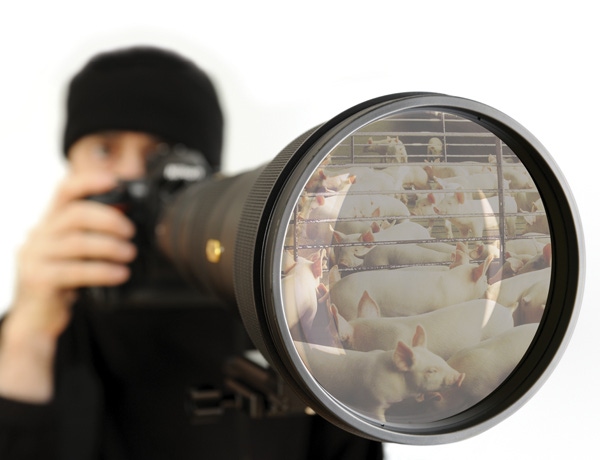It’s been nearly four years since Minnesota pork producer Lynn Becker received the shocking message that an undercover farm video had been taken at a newly acquired 6,000-sow farm in Bayard, IA, and that it was being posted on the Internet.

It’s been nearly four years since Minnesota pork producer Lynn Becker received the shocking message that an undercover farm video had been taken at a newly acquired 6,000-sow farm in Bayard, IA, and that it was being posted on the Internet.
Becker, the chief operating officer of LB Pork Inc., Fairmont, MN, got the word on Sept. 16, 2008, as he was contemplating the start of fall harvest.
His first thought was, “Oh, crap.”
“We had just taken ownership of the farm 28 days prior to the release of the video, so we were completely shocked. Unfortunately, the three-minute video was one of the first ones to have an impact, and it is sometimes referred to as the ‘9-11’ event of animal care in our industry,” he told a crowd at a World Pork Expo seminar last month in Des Moines, IA.
Video Intolerable
Frankly, much of the video preceded the new ownership and management at the sow farm, and it portrayed many things that Becker considers intolerable. “It is all stuff that we have to make sure is not happening in our operations every day,” he maintained.
The video was shot by a member of the People for the Ethical Treatment of Animals (PETA). They wasted no time in launching an e-mail campaign about the surreptitiously taken video, “which had a chilling effect on my farm, family and on me as an individual,” Becker recalled.
PETA had his name, phone number and e-mail address, meaning it was a “direct hit” on him. Within about 24 hours, he had received 1,000 e-mails that literally clogged his inbox.
To his astonishment, the release of the video became worldwide news. Within a few days of its release, a woman from Norway left a message on his telephone answering machine. Becker received hundreds of letters, including one from Germany. There were almost 110,000 printed and online articles associated with the incident that mentioned him by name.
Taking Action
The owners and management of LB Pork immediately contacted state and national pork producer associations, their attorney and other industry associates. “The best thing about it was, they all said we are going to help you through this,” Becker said.
Cindy Cunningham, vice president of communications at the National Pork Board, led a coordinated effort with multiple organizations that helped them build a strategy on how to respond to PETA (they met with them) and the media and move forward with the business, Becker said.
Those alliances helped. Fortunately, his wife, Julie, was in Washington, DC, at the time with the Minnesota Pork Producers Association to meet with legislators. She explained first-hand what had happened, making the situation easier to defend, Becker said.
To deal with this kind of situation, the Minnesota producer said it’s important to be prepared. “Put out your side of the story as soon as possible,” he suggested. “I know a lot of operations now have prepared statements that they can send out to get the facts disseminated as fast as possible.”
The farm also hired a public relations firm to get through the ordeal.
Building a Barn Culture
“I am living proof that it can happen to you, so be vigilant, instill a positive barn culture and investigate anything that might be reported or could be even remotely perceived as poor animal treatment. Proper animal care has got to be the number one priority for pork producers every day,” Becker said.
Animal welfare doesn’t just encompass the pig. Making sure personnel embody the proper barn culture can be equally as important, according to Sherrie Niekamp, director of Swine Welfare for the National Pork Board.
“Everyone on the farm has that ethical responsibility to promote animal well-being and protect the animals that are in their care,” she said during a Pork Academy seminar.
Building the farm culture begins with finding the right employees to do the job.
Niekamp outlined these other important measures:
Background checks: When hiring employees, check references, where they come from and previous employment to learn about their actual desire to work on a hog farm.
Written job descriptions: If you are asking people to work in your operation, it is only fair to provide them with a list of expectations and job responsibilities that they are expected to live up to, Niekamp said. Employee handbooks are extremely valuable, not only from an animal welfare perspective, but from all aspects of employment.
Interview questions: These can be extremely valuable when interviewing potential employees to understand their views toward animal care. Asking scenario-based questions can be good clues to their beliefs, their culture and their ability to be a good fit for your operation.
Animal welfare policy: Set the baseline of your expectations so employees know what you expect of them as well as what is unacceptable activity.
Whistleblower policy: Employees should know who to report violations to and how to report them. All alleged violations must be taken seriously.
We Care principles: Follow the six core principles of ethical guidelines for pork production: food safety, animal welfare, environment, public health, worker safety and community involvement. “Those can serve as the core philosophy of what you expect of employees and how your farm operates within the community,” Niekamp said.
Training: All animal caretakers should be Pork Quality Assurance (PQA)-Plus certified, which pertains to pork safety as well as animal care. Formal documentation shows that you have an established program should there be challenges. Offer retraining to ensure employees are on the right track.
Written standard operating procedures: These provide a standard reference to outline job expectations and give staff feedback on what they are doing right or wrong.
Animal care program: The PQA-Plus program and on-farm assessments help set a level of expectations for employees to keep their eyes open and be alert.
Documentation: Maintain treatment records, a written euthanasia plan and data on daily observation as integral parts of a professional swine industry.
Veterinary care: Consult with your herd veterinarian to establish herd health protocols and provide treatment when animals become sick or injured.
Trucker Quality Assurance (TQA): Ensure animal handlers and transporters are TQA-certified to provide a baseline for setting up, bedding and boarding animals on a truck.
Community outreach: Share personally and through a company Web site with members of the community what you are doing on your farm. Provide outreach to lenders, packers and other industry partners regarding the philosophy and culture on your farm on an ongoing basis. Neighbors can provide social and emotional support if an incident occurs.
Emergency response: Formulate a plan that readies your operation by engaging local law enforcement and other public service organizations.
Action Plan
The National Pork Board has developed basic emergency action plans that can be customized to your operation to handle everything from a weather situation to someone getting hurt on your farm, Cunningham explained.
About the Author(s)
You May Also Like





